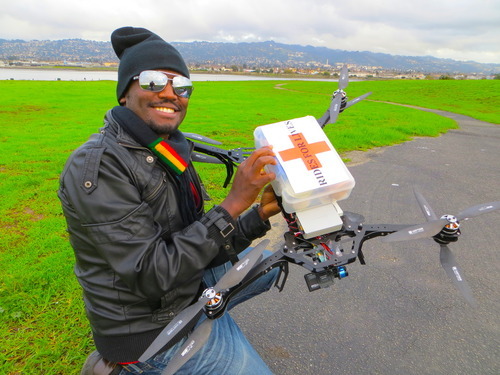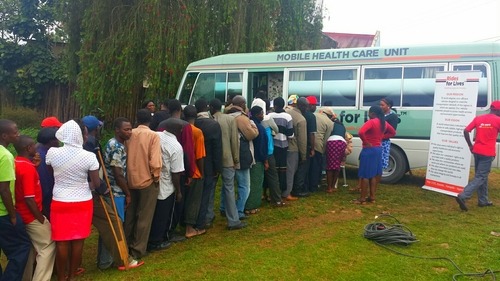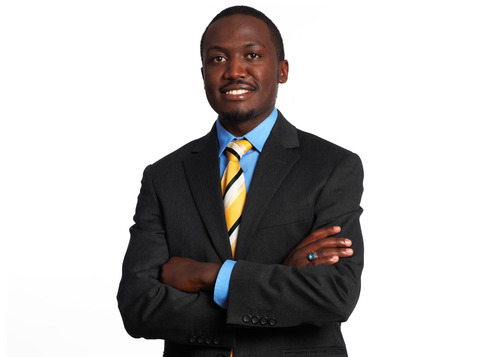
Meeting Christopher
Ategeka in the high-rise business incubator
where his three start-ups are headquartered in San Francisco, one would never
guess that this urbane young man, named last year as one of Forbes
Magazine’s 30 under 30 social entrepreneurs, started life in a thatched hut
with dirt walls in rural Uganda—and was in his teens before he owned his first
pair of shoes.
Imagine a nine-month-old baby in sub-Saharan Africa, taken
away from his mother when his parents’ marriage dissolves. His father is a
traveling merchant, who only occasionally returns to their village. The baby is
left in the care of his paternal grandmother, a deaf-mute living in dire
poverty. His grandmother is consigned to the profoundest social isolation in a
place where illiteracy is the norm for women of her generation. Loving and
resourceful, she has invented a private sign language, which she uses to
communicate with her grandson (who, as a result, becomes preternaturally good
both at expressing himself and figuring out what others are trying to say). She
nurtures the infant on whatever milk she can barter for scavenged grain. He
starts life holding tight to a precious kernel of knowledge that will help him
throughout the harrowing years to come: there is someone on this earth who both
loves and believes in him.
Christopher Ategeka didn’t even know precisely how old he
was until he managed, on one of his business trips back to Africa, to unearth
records that established the year of his birth as 1984.
Raising His Family
By the time a child in America would just be starting the
second grade, Chris had lost both his mother and his father to HIV-AIDS. When
he was somewhere around seven years old he became the de facto head of his
household. “An age,” quips the UC Berkeley engineering graduate, “when American
children usually aren’t expected to cross the street by themselves!” He became
the eldest male in a household that included his grandmother, various other
relatives and his four step-siblings, all living together in a mud house
without electricity, plumbing or any of the luxuries taken for granted in the
developed world. Water had to be hauled by hand or carried atop one’s head,
walking for hours down dusty roads. Food was scarce and hard to come by.
Finding enough food for survival was the focus of every day. “I worked in
gardens, weeding, harvesting, lawn mowing, grazing animals and collecting trash
in exchange for food,” Chris told Yahoo Small Business, “and later started to
get paid cash.”
The youngster worked hard, both to keep himself alive and
take care of his siblings. “I started off with the help of grandma and other
relatives—then the kids were passed on to me.” With some adult helping hands,
he was able to construct a mud hut that he and his siblings could subsist in on
their own. “It’s still there today,” Chris told us with obvious pride.
Child-headed families are common in Africa because of all
the children orphaned by AIDS, malaria, cholera and now Ebola. “There are
millions of them,” says this up-and-coming star of the global service
community, “because the immediate relatives can’t afford to add five kids of
the recently passed-away relative on top of their own already over-large
family.”
When Chris was around twelve, each of the children in his
little household was sent off to live with a different relative. The uncle who
got Chris, a farmer who was none too happy to find himself with another mouth
to feed, decided to make use of his nephew as a human scarecrow. It was the job
of this child—who would, in 2014, be recognized for his global service by the United Nations—to stand
for hours in a crop field as dawn broke, throwing rocks at predatory birds,
chimpanzees and baboons, until it was time for him to set out, barefoot, on his
hours’ long walk to school.
To survive such a childhood is
amazing. To survive such a childhood to become a renowned inventor, honored at
the White House, lauded worldwide
for products that save lives and make the world a better place—well, that is
more than extraordinary.
A
Defining Incident
There was one incident, among the
myriad scenes of horror, fear and loss, that would haunt Chris forever and
become the inspiration for his career. One of his younger brothers became very
ill. Improvising a gurney of sorts from a piece of cloth, the children tried to
carry their brother to the nearest healthcare facility, which was many miles
away. He died in their arms as they struggled to get him to a doctor or nurse
who could, without doubt, have saved his life.
If only there had been a better way
to transport him, a way that would be within reach for even such a desperately
poor family as his own!
This was the moment when the seed for
CA Bikes (now called Rides for Lives),
the first of three companies founded by Chris, began to germinate inside the
sleep- and food-deprived lad whose brilliant mind was mostly taken up with the
moment-to-moment exigencies of survival.
“Talent is universal, but
opportunities are not,” says Chris, who managed to earn both his bachelor’s and
master’s degrees in mechanical engineering from the prestigious program at UC
Berkeley in record time by developing a habit he still has now of working
extraordinarily hard on very little sleep. “A seventeen-year-old computer
genius in San Francisco is not any smarter than a seventeen-year-old kid in the
jungles of Africa. They were just born on an uneven playing field.”
Y.E.S. Uganda, a church-based NGO
and orphanage, found out about Chris’s plight and offered to help him keep
going to school. And then funding came through to help one of the hundreds of
orphans in their care to follow a college prep curriculum, rather than simply
learning a trade. Chris was chosen.
Carol Adams, the founder of YES
Uganda, reported on Chris’s progress to his American benefactors, Martha and
Michael Helm. When they learned of the hike Chris had to take every day to get
to and from school, they bought him a bicycle.
What had been daunting and painful
suddenly became a matter of joyful ease. Chris used the time he saved every day
to study hard. By the time he graduated high school, the Helms sent for Chris,
now 20, so that he could live with them and attend college in California.
“I am the luckiest guy alive,” wrote
Chris on a Reddit
AMA that crashed multiple times with the outpouring of heartfelt responses
to his tale. “I am living the dream—three meals a day!”
Chris Ategeka’s ambitions didn’t stop with his own safety
and comfort. On temporary leave from his PhD program at Berkeley, he is
nurturing three high-profile startups dedicated to helping others.

Rides For Lives
One of these is San Francisco-based Rides for Lives, a
highly innovative provider since 2011 of medical services in rural Uganda, with
a field office in the country’s capital, Kampala. The company
manufactures locally sourced, specially adapted medical vehicles—many of them
designed by Chris—with the mission of improving access to medical care as well
as creating economic opportunities for the country’s most vulnerable citizens, over
86 percent of whom live in remote areas. Chris spends half the year in
Kampala overseeing the company’s operations, growing the fleet of bicycle
ambulances and an array of other two- and three-wheelers specially adapted for
the disabled. Local workers are hired and trained to manufacture these as well
as Ride for Lives’ mobile health units, refitted buses that bring a general practitioner,
a pharmacist, medicines and interventions to people without other access to
medical care. Each bus is equipped with a fully outfitted onboard lab for HIV,
malaria and cancer screening, as well as family planing services and preventive
care. Lately the company has started using customized drones to deliver
life-saving medicine to people who would not be able to get it otherwise.
Two more startups
As if this weren’t enough to keep one person busy, Chris is
co-founder with fellow Cal graduate Anwaar Al-Zireeni of a start-up
biotech firm, Privail, which is developing
point-of-care diagnostics for the early detection of infectious diseases, with
an initial focus on HIV. Their goal is to provide simple and affordable tests
that will enable patients throughout the world to take earlier action in
seeking medical treatment.
He’s also founder and partner of New Focus Africa, an intensive mentorship
and funding program designed to help mission-driven African entrepreneurs build
better products and forge the connections needed for success. “We aspire,” says
Chris, illustrating his point on a whiteboard, “to bridge the gap between the
continent and the global startup ecosystem.”

Startup and
Entrepreneurial Advice from Chris Ategeka
We asked this inspiring entrepreneur for his top three
pieces of advice for other people who have a great idea but aren’t quite sure
how to turn it into a reality. This is what he told us:
- Have a clear model with concrete goals
- Set timelines and organize your tasks
- Start with increments: make your plans for day
1, day 5, day 10—then day 30, day 60 and day 90 before setting your 5-year goal
What is it, we wanted to know, that allowed him, despite all
his hardship, to become so successful.
“People like me,” he told us with stunning honesty, “are
driven by fear. Not so much now, because I have multiple engineering degrees
from Berkeley. But very much so for most of my journey. Fear that this new opportunity
may not last…so you want to make the best out of every inch of it before it’s
gone. Fear of letting people down—someone believed in you, sacrificed resources
to make sure that you can be somebody someday. You don’t want to mess that up!
Fear that you could go back to the hellfire you just escaped.” Chris says that
fear kept him running forward, despite all the obstacles he met along the way.
We wondered whether there’s ever a conflict for him between
making money and his overall goal of stretching out his arms to people who are
still as destitute and miserable as he once was. “You can never help the poor
if you are one of them,” he told us. “There is simply not enough philanthropic
capital or foreign aid to solve Africa’s problems, on the scale they exist, in
the foreseeable future.” He is optimistic about the potential of a bottom-up,
capacity-building approach for the future of Africa and the rest of the
developing world. “To defeat Africa’s challenges, we must harness truly
sustainable and scalable models by creating jobs for Africans—giving them the
tools to solve their own problems.”
Chris was commencement speaker for the graduating class of
engineers in 2011 at UC Berkeley. He remembers that day as one of the best
moments of his life. His grandmother, who is in her 80s now, couldn’t make it
to the ceremony—and wouldn’t have been able to hear him, of course, even if she
had. But he was able to show her the video when he came to visit her in Uganda.
There he was, all bedecked in his blue cap and gown, smiling broadly, honored
by an audience of thousands. “She was crying and very proud!” he told us.
A compelling story is essential for any entrepreneurial
venture hoping to stand out among all the millions of start-ups in the world.
We asked the founder of Rides for
Lives to offer our readers the five most important things, in his opinion,
that should be included in the origin tale of every entrepreneur. (Watch Chris’s
TED Talk to see these five elements brought to life as he tells his own
story!)
- Funny—This
makes it memorable - Personal—This
shows your passion - Relevant—Relate
to your audience - Authentic—Be
real, be yourself - Transporting—Take
the listener on a journey
Chris Ategeka has taken a long journey from the poverty and
pain of his childhood in rural Uganda to his position now as a San
Francisco-based engineer and visionary social entrepreneur. His dream, he confided,
is to connect talented young people in places where their ideas and potential
might otherwise go untapped—throughout the developing world—to sources of money
and opportunity in places where both of these are plentiful.
With the hard-won knowledge he has of both worlds, Chris
wants to dedicate his professional career to being what he calls an
“opportunity/talent catalyst”—to give
to others the gift that was given to him by people who could see beyond yet
another child doomed by poverty and hunger to a life of scant potential.
Talented young people everywhere, he passionately believes, deserve the
opportunity to focus on solving the world’s biggest problems—and the world
needs their ideas.
“This is what I would like to be remembered for,” writes this
man much given to smiling, who is still only 30 years old. “Something I will be
proud to talk about 50 years from now.” In a post-script, he added, “Let’s do
another interview then!”
- Author Barbara Quick
- Type article
- Image https://31.media.tumblr.com/a5b10a2d28ca5b38d3fa3ec3d101cb16/tumblr_inline_njbqdpPun21sbcn66.jpg
- Provider Yahoo Small Business Advisor





